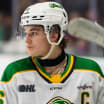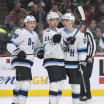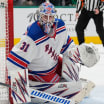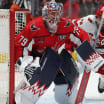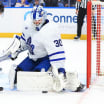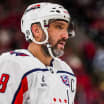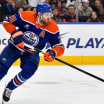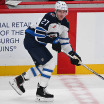When the United States opened training camp for the 1996 World Cup of Hockey at Providence College in mid-August of that year, the importance of what everyone there was hoping to accomplish was immediately established by coach Ron Wilson and general manager Lou Lamoriello.
U.S. victory against Canada in 1996 World Cup of Hockey still inspires
Win in final showed growth of American players, influenced generation
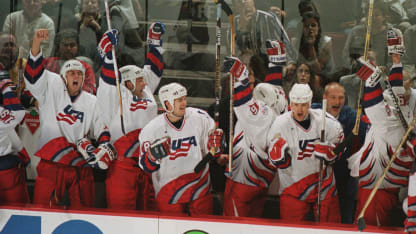
© Glenn Cratty
"We had it hammered home to us by Ronny Wilson and Lou right away that the U.S. had really never beaten Canada best-on-best," said Brian Leetch, the U.S. captain in 1996. "That was always just parked in our head that we should believe that this team could do it.
"It felt big to us."
It was big and still is 25 years after the United States' 5-2 victory against Canada in Game 3 of the best-of-3 final at Molson Centre in Montreal on Sept. 14, 1996. Defeating Canada for the first time in a best-on-best tournament was a seminal moment for USA Hockey and the rivalry between the North American neighbors.
Just as the "Miracle on Ice" gold medal-winning team at the 1980 Lake Placid Olympics opened eyes about the American amateur player and sparked the growth of the sport in the country, including inspiring members of the 1996 team, the World Cup championship established that top U.S. players were on par with the best in the world and begot future generations.
"There were two really significant dates that affected USA Hockey more than any one given time and that was the '80 Olympics and the '96 World Cup, in my opinion," said Lamoriello, now GM of the New York Islanders. "I think in the '80 Olympics, certainly, the college player was recognized in a different way as far as the potential of professional hockey goes. … And then you go to the '96 World Cup, which, in my opinion, solidified the quality of players that the U.S. had."
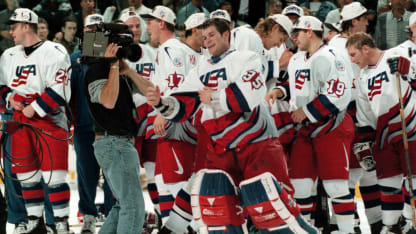
© B Bennett/Getty Images
\\\
Maybe it took a miracle for a collection of U.S. college players to upset the powerful Soviet Union before defeating Finland in their final game of the 1980 Lake Placid Olympics. But nothing supernatural was required for the United States to defeat Canada in the final of the 1996 World Cup.
Sure, Canada's roster included 11 players who were later inducted into the Hockey Hall of Fame: forwards Wayne Gretzky, Mark Messier, Joe Sakic, Eric Lindros, Brendan Shanahan and Steve Yzerman; defensemen Rob Blake, Paul Coffey, Scott Niedermayer and Scott Stevens; and goalie Martin Brodeur. But the U.S. team was loaded too.
Leetch, a two-time winner of the Norris Trophy voted the best defenseman in the NHL, was among six future Hockey Hall of Famers on the U.S. team (forwards Brett Hull, Pat Lafontaine, and Mike Modano, and defensemen Chris Chelios and Phil Housley). Those six and 11 others from the team were also inducted into the United States Hockey Hall of Fame: forwards Tony Amonte, Bill Guerin, John LeClair, Keith Tkachuk, Doug Weight and Scott Young; defensemen Derian Hatcher, Kevin Hatcher, Mathieu Schneider and Gary Suter; and goalie Mike Richter.
"The thing that I remember most about that tournament is the first day we stepped on the ice at Providence College in training camp just how fast and how crisp and how deep the whole team was," said Schneider, an assistant to the executive director with the NHL Players' Association since 2011. "I think it was maybe the first time where you could look at our roster up and down and say, 'Yeah, it shouldn't be considered an upset necessarily.' We had some of the best players in the game on our team."
The United States went 3-0 in pool play, defeating Canada 5-3, Russia 5-2 and Slovakia 9-3. For finishing first in its pool, the United States received a bye to the semifinals, where it defeated Russia 5-2. Canada defeated Germany 4-1 in the quarterfinals and Sweden 3-2 in double overtime in the semifinals to advance to a showdown with the United States.
It was a rematch of the 1991 Canada Cup final, which Canada swept in two games. The United States was not intimidated.
"We felt we were as good (as Canada), but we knew we had to beat them," Guerin said. "And we knew there was only one way to do it too, and that was to kind of beat them at their game."
\\\
Though it was September, the United States' determination to match the Canadians' physicality produced a ferocity in that series that felt like the height of the Stanley Cup Playoffs to the participants.
"It was just great hockey," said Canada forward Rod Brind'Amour, now coach of the Carolina Hurricanes. "I remember the games were physical. I actually watched one of them a couple years ago and I couldn't believe the way it was played. It was so different than today with the hacking and the holding. It was just a war-type game."
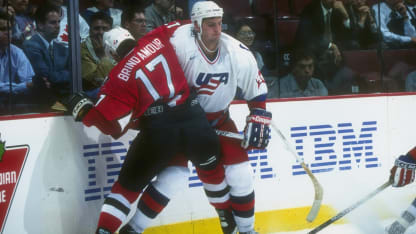
© Rick Stewart
In Game 1 in Philadelphia, LeClair tied it with 6.3 seconds remaining in the third period before Yzerman gave Canada a 4-3 victory with a goal that went in off Richter 10:37 into overtime. The United States rebounded with a 5-2 victory in Game 2 in Montreal with LeClair scoring twice and Richter making 35 saves.
But the United States needed one more win to complete its mission.
"Leading up to those final two games in Canada in Montreal, we thought, here's an opportunity just to kind of swing the needle into our favor," said Modano, now an executive adviser with the Minnesota Wild. "Looking back, I think those three games were some of the dirtiest, nastiest, best hockey I think I've ever played in."
The second period of Game 3 included 37 minutes in penalties, including a slashing double minor on Canada defenseman Adam Foote and a slashing major and 10-minute misconduct on Tkachuk, before Lindros scored with six seconds remaining to tie it 1-1. Canada went ahead 2-1 when Foote scored with 7:10 left in the third period, but Hull retied it for the United States by deflecting in Leetch's left point shot past Curtis Joseph with 3:18 remaining.
Amonte scored on a rebound 43 seconds later to give the United States the lead before Derian Hatcher and Adam Deadmarsh scored in the final minute to seal the victory and begin the American celebration in front of a stunned Molson Centre crowd.
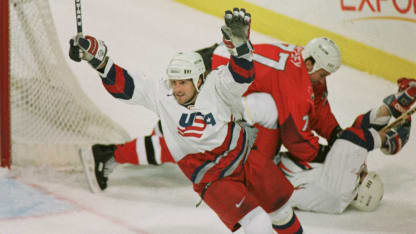
"It was really enemy territory," said Paul Holmgren, an assistant on the U.S. coaching staff and now a special adviser for the Philadelphia Flyers. "Almost sounds like a cliche, but Canadians, you know what they think of hockey. It's their sport and we took it away from them, at least for a little bit of time. So it was pretty cool."
\\*
Chicago Blackhawks forward Patrick Kane, a 7-year-old growing up in Buffalo at the time, remembers watching.
"So many great players," said Kane, a three-time Stanley Cup winner and two-time U.S. Olympian. "Pretty cool that it was like a three-game series. I remember that Yzerman overtime winning goal that hit Richter and went off him up and over. Obviously, the U.S., Tony Amonte scoring the winning goal there on the rebound. He put it up on the top shelf. Brett Hull tipping one in. … So that's a big tournament. That's probably the last big tournament the U.S. won."
The United States came close when it lost to Canada in the gold medal games of the 2002 Salt Lake City Olympics and 2010 Vancouver Olympics but hasn't won a best-on-best tournament in men's ice hockey since the 1996 World Cup. The impact of that win is evident, though, through the development of more top players in the country and success in international tournaments at other levels.
The United States hadn't won the IIHF World Junior Championship before it defeated Canada in the 2004 final and has won it four more times since then, including 2021. The United States also has won the IIHF Under-18 World Championship 10 times since 2002.
"Our younger players now, we beat Canada as often as they beat us now in World Juniors," said Guerin, now the Wild GM. "In all these other tournaments, they still have numbers, but our top guys are as good as their top guys and it's really evened it out."
The 1996 U.S. players were inspired by the 1980 U.S. Olympians, and similarly the 1996 World Cup championship provided a motivational benchmark for the next generation of United States-born NHL players such as Kane, Islanders forwards Zach Parise and Kyle Palmieri, Flyers forward James van Riemsdyk, Tampa Bay Lightning defenseman Ryan McDonagh and Washington Capitals defenseman John Carlson.
The growth was simultaneously fueled by the founding of the USA Hockey National Team Development Program in 1996 and carried over into the current, younger generation. Calgary Flames forward Matthew Tkachuk was born in 1997 but understands the importance of the 1996 World Cup because he and younger brother Brady Tkachuk of the Ottawa Senators watch video of it and talk about the games with father Keith each year around July 4.
"I think the 1980 team did that for my dad's generation, and my dad's generation winning the World Cup did that to our generation," Matthew Tkachuk said. "Hopefully we can do something special in the next international event, whether it's Olympics or World Cup. Hopefully Olympics, that's the next one, change hockey for the next generation."
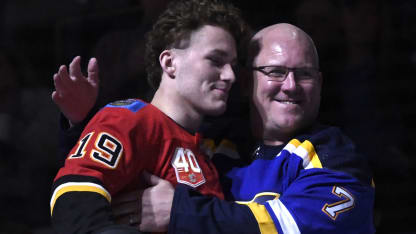
© Scott Rovak/Getty Images
Those selecting the United States roster for the 2022 Beijing Olympics, including Guerin, an assistant GM, will have a much deeper pool of talent to choose from. In 1995-96, 155 (18.1 percent) of the 855 players who played at least one NHL game that season were from the United States, and 529 (61.9 percent) were from Canada. Last season, 289 (28.6 percent) of the 1,011 players who played at least one game were from the United States and 427 (42.2 percent) were from Canada.
Of the 241 players (nine rounds) selected in the 1996 NHL Draft, 138 were from Canada (57.3 percent) and 29 were from the United States (12 percent). In the 2021 NHL Draft, 82 of the 223 players selected (seven rounds) were from Canada (36.8 percent) and 50 were from the United States (22.4).
"There were always special players in those days," said Claude Lemieux, a forward for Canada in 1996 who is now a player agent. "But if you look today in volume, the U.S. with its population and how much growth hockey has seen, there's definitely a much deeper pool of really good players and some of our best, like (Toronto Maple Leafs forward) Auston Matthews, who grew up in Arizona and I had the pleasure to coach when he was very young."
Matthews was born in 1997, so the impact of the 1996 World Cup on his development was limited, but he acknowledged that it provides inspiration for any United States-born player in international competition.
"I think 1980 and the movie about it, 'Miracle,' I think a lot of young American hockey players watched that," Matthews said. "After that, 1996 is inspiring and it fuels you to want to represent your country, especially with the Olympics coming up. It's something I aspire to. It will be an exciting year, and you can look to 1980 and 1996 as inspiration for American kids learning about the game."
NHL.com senior writer Dan Rosen, deputy managing editor Adam Kimelman, and staff writers Tracey Myers and Mike Zeisberger contributed to this report

